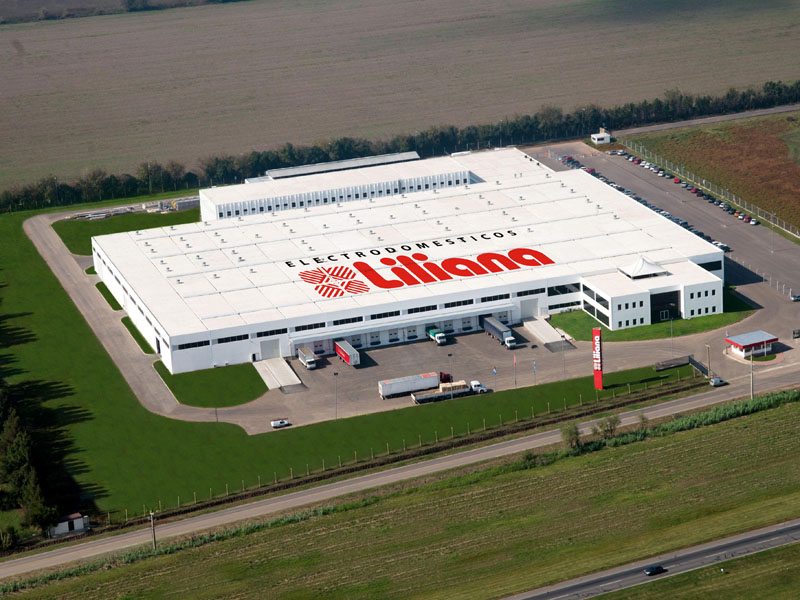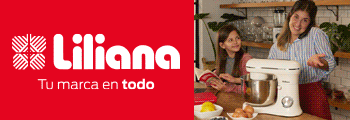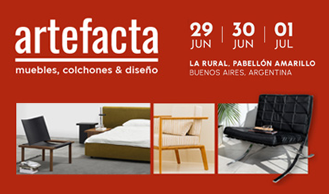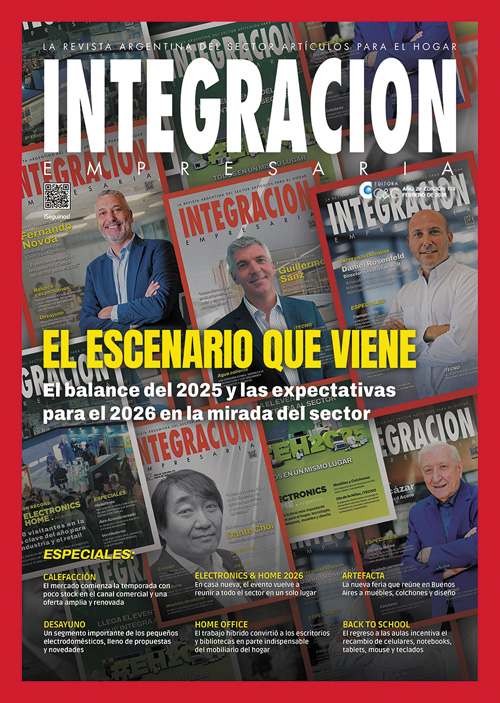Liliana appliances: History of a successful brand

Quality, service, products at affordable prices and conversion. Without these qualities hardly Liliana would have become what it is today: the brand of appliances No. 1 of Argentina. Like every local SME, the company based in Rosario went through different economic fluctuations in its 71 years of life. Even the effect of the pandemic left it between the strings but time put things in its place and managed to overcome. Now, in 2021, he bets again on expansion consolidating its course as one of the main companies in the national industry.
Liliana is a family, a legacy that Cintia (42 years old), Fernando (41) and Leonardo Jacobson (32) inherited from their father Oscar and his grandfather Aaron, the creator of the company.
This look moves to its 900 employees. "We transmit that message to people because one is growing in structure, in many personnel and makes our treatment with people exist but in a different way through our trusted people, our structures and with our human resources management. Above all, we want to make people who work with us seriously part of what Liliana is," summarizes Leonardo, current managing partner.
The three are part of the third generation of Liliana: Cintia is in charge of the administrative and financial part, Fernando deals with the development of products in the commercial part and the shopping sector while Leonardo is the partner manager. There is also Javier (36), the fourth brother who occupies a position Part Time, and Patricia, the mother of the four Jacobson. All are partners manager of the company.
The woman's name that carries the company refers to remote times: in the ‘50s companies used to associate any article for home with housewives. But Liliana was permanently rewritten its history, manufacturing a great variety of products that comprise the kitchen lines (processors, blenders, whippers, mixers, cooking, gradores, picadores, bells, purifiers), breakfast, clothing, aspiration, heating, ventilation and garden for all genres.
The origin of the brand
The beginnings of this family business date back about 75 years. In the mid -40s, Aaron Jacobson, a Buenos Aires based in the city of Rosario, in the province of Santa Fe, was dedicated to the textile item by manufacturing and sale of clothing. Then, he began handling cutting and sheet tubes and thus designed the first Jacobson brand sewing machine.
By Maximiliano Kronenberg / Iprofesional
As he did not want his brand to take his last name in the products he made, he began to look for a new name for his company. The man brought some proposals to the registration of brands and patents from Rosario with the bad fortune that always bounced them. In most cases, the domain was already registered.
Tired of any attempt to be in vain, the following dialogue with the employee of the brand record that always bounced the name was produced. A simple anecdote that marked the course of his company:
You bounce all brands, I already tired. What is your name?
-I call Liliana. But what does it have to do?
"Do you think Liliana can walk with the products? Aaron asked.
Do you like Liliana? Look if it exists, the man insisted.
-It does not exist. It can walk, the employee replied.
In this way, the name "Liliana" was baptized as the brand of appliances, the company founded by Aaron Jacobson.
"The Jacobson brand exists, we did not use it but my grandfather had it. I wanted to migrate to another, maybe I wanted it not to be his last name but then registered the Liliana brand and we began to give machine to the name with the growth of things," says his grandson Leonardo, the youngest of the four brothers.
After sewing machines and the experience acquired in the management of electric plates and motors, the first Liliana brand blender appeared. "I had a glass jug and a sheet body, it weighed about 30 kilos!" Remember with a laugh.
Already with the productive know -how, this small company that had about 100 employees began as a brand that marketed its products to the residents of the Alberdi neighborhood. After the blender, the Liliana grass cutting machines appeared, famous in Rosario who would eventually become one of the company's emblem products.
In the ’60, Oscar Jacobson, son of Aaron, joined the factory with just 15 years. His arrival changed the company's course again. "We began to venture into what we call small appliances that are the kitchen appliances, mainly the multiprocessor that today is our flagship product. It was an invention of my old man when it began to get into the business," says Leonardo.
With the sewing machine, the grass cutting machine and the multiprocessor installed in the market, the manufacture of other items related to ventilation and heating came. One of them was the verticalefactor stove (the typical heater that has a candle of a quartz tube) and a line of ceiling and standing fans. Today Liliana is the company N ° 1 in this area with a market Share of 35% in the market.
Landing in Buenos Aires
Liliana was growing from the acquisition of a matrix, which allows us to have a greater and better product development and the incursion of plastic injection. "Until that moment all products were made of sheet or metallic. Then the injected plastic began to be used - which is what is used today - that generates greater productivity and allows other products to have a better production cost and a durability similar to the metallic," explains the managing partner of the company.
It began to expand from the emergence of plastic. For two decades, he stepped hard inside thanks to his clients or retails of the moment. But the real impact would come later. At the end of the ‘80 and much of the '90s their products were marketed in the Musimundo chain. Then, his great landing in Buenos Aires came with his articles in the main appliance stores such as Frávega, Garbarino and Ribeiro. Immediately, the large chains of Coto, Carrefour and Walmart supermarkets were added.
And that was not all: beyond having become suppliers of the big stores, it also began to manufacture items for the main chains of appliances that sought to seduce the client with their own brand as a fravega that the Sigma, Musimundo (Standar Electric) and Garbarino (Coventry) brand has. All these brands are manufactured by Liliana from its gigantic plant in Rosario.
Then, he began to manufacture appliances to the Supermarkets Coto (Top House), Jumbo (NEX) and Walmart (Durabrand). "To manufacture all these brands we had to go through some standards and a very important quality audit," says Leonardo Jacobson, and complete: “We are one of the few suppliers of appliances that is enabled worldwide to produce any Walmart through the Durabrand brand. It is another‘ sheet ’that we have apart from the fact that the company certifies with the standards is 9001 14001, with all international standards and standards of appliances, ”he emphasizes.
The arrival of the third millennium led to an unprecedented economic and social crisis in Argentina. Many companies were affected in 2001 and some had to definitely close their doors. However, the Jacobson kept the company afloat although they had to reinvent themselves.
A year later, the factory began to be a supplier of Electrolux Argentina, the subsidiary of the Swedish multinational, with the manufacture of the lustraspirator, becoming another icon of the company together with the lawn corterator and the blender.
In this way, Liliana became a manufacturer for foreign companies. It produces ventilation lines, heating, small appliances, vacuum and electrolux plates. "This was very important for our company because it allowed us to learn about the process of international manufacturing and international quality standards that we transmit to our products, generating an increase in the quality of our Liliana products that reaches international quality standards. That allowed us to put ourselves to shoot and compete with multinationals," emphasizes Leonardo Jacobson.
Therefore, it also exports the electrolux brand for Electrolux Chile and Electrolux Peru. "We are producing with the Liliana brand some customers in Uruguay, Ecuador and Paraguay although our main sale is aimed at the domestic market. Although the export percentage is not very important, we are focusing to see if we can increase it," says the executive.
However, the company always pointed to the local market. "We have the responsibility of putting an accessible and international quality product in the house of Argentines. We always try to put this in value," explains Jacobsen.
An imposing plant
That "SME" that had begun to manufacture home products from Garage of Don Aaron's house began to expand through the purchase of different properties or nearby houses. Thus, the factory was growing, becoming the great company of the Jacobson family.
Since 2014, the Liliana plant has been located in Granadero Baigorria, also in Rosario, and has 25,000 square meters on a land of 75,000 square meters.
There are four factories within one: a sector with 65 plastic injectors that operate in three shifts, a matrix -also in three shifts due to high demand -an assembly space and another machining of mechanical pieces, called “chapería”. Both work two shifts. There is also the dispatch sector and the distribution center.
"We have the possibility of growth and this year we will expand it about 10,000 more square meters to expand our productive capacity and especially to import substitution, to manufacture products that we used to import as electric ovens since before we were importers and now we will start manufacturing them," says Leonardo Jacobson.
Another novelties will be the return of the electric flows that in principle had been of local origin and then had to be imported by not being able to compete with China, but now they will be again from the national industry.
Reconversion
The conversion defines Liliana's DNA as to most Argentina's companies that crossed several periods of economic crises over time. "If you do not constantly reconvert you or if you are not up to the needs if you do not have an agile company, the future is complex. Having 1,000 people in charge; it is a lot as it is also 100 or 200," Jacobson slides.
For the executive, the reconversion, the agility and the flexibility form the heart of their company. "When it was time to manufacture, we manufactured, and when they were not times to manufacture and all outside we had to accommodate very fast. We had political, financial and economic crises but fortunately we can say that the company exists."
And he continues: “With much effort and for a way of seeing things from the point of view of making them agile we have survived all crises. I do not know if we have been strengthened but at least we have come out with learning, with more experience, but I insist: in order to have a sustainability in the time of a business in Argentina, one has to be very attentive to the rudder, namely when one has to accelerate, when one has to accelerate and do it.
The conversion came again in pandemic times. The six months of quarantine put the company against the strings in front of a situation that no one had lived: an "eternal quarantine" by Coronavirus added to the economic uncertainty that plagues the country. "We didn't know where the shot was going to leave," says the youngest of the Jacobson.
"With the factory totally closed we had a very big concern because with a closed business the future is uncertain. Like all citizens in the world at the health level, we did not know what was going to happen to us, with humans. There was much fear and uncertainty until we got together with my brothers, those who handle the company, and we said that we cannot have all our productive capacity to stop without being able to contribute to all this situation that we are living.
In record time they designed two facial protection masks together with the province of Santa Fe and the Ministry of Science and Technology of the Nation and the city of Rosario. "We did a job together to see what doctors need at that time. The reaction was to have a personal security product was for doctors in March-April of 2020, when in China and in Spain they said that health personnel had no protection or did not supply with chins. That is why we designed this exclusive mask for doctors."
And in just seven days they could develop plastic masks, an essential product for the health care of doctors against Coronavirus. “We worked 24 hours so that this could go out quickly. We achieved a very good product, which the doctors asked for. The beginning of the production was destined for the donation and then became the only income to be able to hold the payment of the salaries of the company since the factory was still closed and we were only manufacturing protection masks against COVID-19. We could not hold the entire company with the manufacture of the masks, We had only 20 people assigned for this production, a product that had nothing to do with the manufacture of Liliana appliances, ”recalls Leonardo.
Then, the company insisted on the provincial authorities that the manufacture of the heating were also essential for the population to the possible shortage. "We are the main producers, there are also other companies. After 15 days we achieved the authorization and we could open the factory to develop this product."
Given the delicate situation, Cintia, Fernando and Leonardo Jacobson thought of making chins and bats for doctors. But with a little more advanced pandemic reactivation came. People could not leave their homes but had some extra money and then they began buying home products online, including appliances.
"There we began to experience an increase in the demand that made us fully put ourselves in our products and advance in that sense. The demand for chins and the entire health issue was already covered. It was no longer an emergency that we had to attend," concludes Leonardo Jacobson.
Liliana in numbers
Currently, Liliana manufactures 300 models of appliances including her own brand and also for third parties from her factory of 25,000 square meters in Granadero Baigorria, also in Rosario. Its production does not supply, since it produces about 10,000 daily products. For this reason, the company is in expansion plans with an extension of its plant of another 10,000 square meters and will add 300 employees in the short term. In this way, it will double its endowment in 1,200 workers in a year.
The company concentrates a 40% -50% market share in the local processor market and another 35% in the heating and fans market, being No. 1 in this area. In total, it occupies a 35% market share in all the products it manufactures.
-If Liliana is a national company that also manufactures third parties and other international brands, how does it compete with multinationals?
-We have lived together with international renowned brands such as Philips, Moulinex and Oster. We competed with our Liliana products, a lower product and at a lower price trying to always offer a little more. If a Philips blender was basic and left 100 pesos, Liliana's had an additional accessory and was worth 80-90 pesos. In addition, we try to emphasize the after -sales service that multinationals do not have it very developed or do not have an adequate provision provision.
-Is the multiprocessor the flagship product until these days?
-Yeah. In this market, together with the Liliana, Electrolux and Black+Decker brand, all manufactured by us. We have Market Share of approximately 40%-50%. It is a very important participation in the processing market and we defend it by cape and sword, renewing the design year after year and also the technological aspect, we add functionalities and model spectrum (greater variety). Liliana tries to offer the consumer a large product fan. At first it was oriented to low -priced products and over time through quality and learning improvements in product and production development we could get a wide line of low -priced products or that aim to make a volume to more massive markets, products of a mid -range and “high end” products and more premium with Liliana brand that compete with renowned brands and generally do it at a lower price. That has positioned us as a very complete offeror in the eyes of the consumer.
-Ionardo, what is it like working with your brothers?
-My Dad died almost 6 years ago. It was always to include us; I wanted us to participate and learn. Instead of going to the club, we played in the midst of plastic injectors, that's why we were sucking since childhood, which was to have a business in Argentina, which was to manufacture something, pay salaries and have people in charge. We have seen the crises in my old man's face. I remember that in 2001 I had recorded my parents' faces. I don't forget that anymore. My son will remember mine at the time of quarantine. We were sucking from very small to have a company, have a big responsibility trying to learn and help while we studied. My dad always went forward, accelerated when he had to do it and bet on growth. Working as a family has an additional plus where trust is not in doubt. Then one generates a different speed and with this I want to say that there are no conflicts, clashes or sparkles, there is surely some rubbing if you work with your brothers.
I value work as a family, we are different people and we will have our differences in some things but we share the same Labor Code. We know what it cost us to reach where we are, we defend our work, our company as a source of entry of our families, we defend it by cape and sword and make a lot of synergy to the point that the driving of the company is carried out by my sister Cintia and my brother Fernando. We also have another brother, Javier, who is more part-time in the company. Luckily we get along.
Latest news
Outstanding sector













